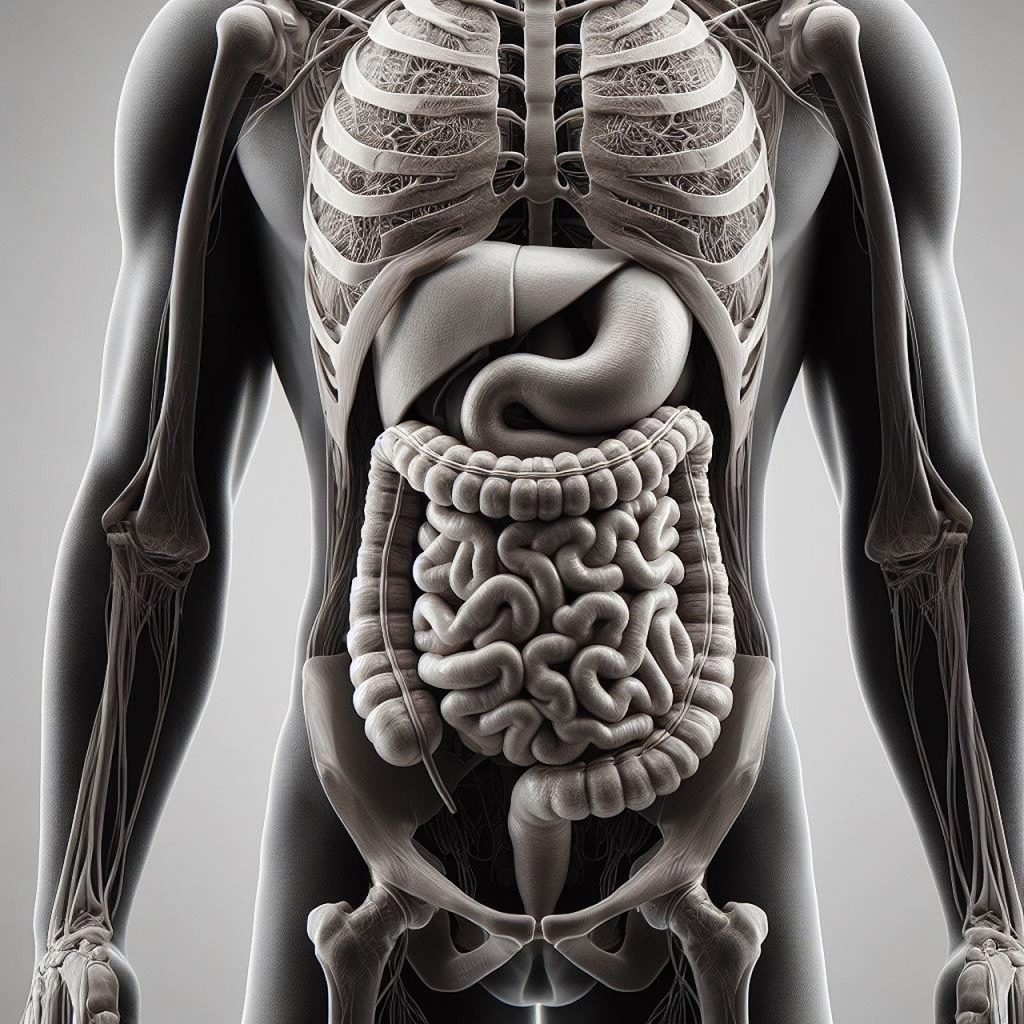Symptoms, Causes, and Management
Irritable Bowel Syndrome (IBS) is one of the most common gastrointestinal disorders, affecting millions of people worldwide. Despite its prevalence, IBS often goes undiagnosed or misdiagnosed due to its varied symptoms, which can overlap with those of other conditions. For individuals living with IBS, managing the symptoms can be a challenge, but with the right approach, it’s possible to minimise these so life can be more enjoyable.

What is Irritable Bowel Syndrome?
Irritable Bowel Syndrome (IBS) is a functional gastrointestinal disorder, meaning that it involves a problem with how the bowel functions, without any visible damage or disease to the digestive tract (Lacy et al., 2016). IBS is characterised by abdominal discomfort or pain, bloating, and changes in bowel habits, including diarrhoea, constipation, or a mix of both. While it is a chronic condition, the severity and frequency of symptoms can vary greatly from person to person.
IBS is considered a disorder of gut-brain interaction, which means that both the digestive system and the nervous system play a role in the condition (Drossman, 2016). This disorder affects the colon (large intestine) and can be triggered or worsened by a variety of factors, including diet, stress, hormonal fluctuations, and gut microbiota imbalances.
Symptoms of IBS
The symptoms of IBS can range from mild to severe and typically include:
Abdominal pain or discomfort: Often described as cramping or bloating, this is a hallmark symptom of IBS. The pain usually improves after a bowel movement but may return after eating.
Changes in bowel movements: IBS can lead to a variety of bowel irregularities, including:
Diarrhoea-predominant IBS (IBS-D): Frequent, loose stools or diarrhoea.
Constipation-predominant IBS (IBS-C): Infrequent, hard stools or difficulty passing stools.
Mixed IBS (IBS-M): A combination of diarrhoea and constipation.
Bloating and gas: Individuals with IBS often experience abdominal bloating and increased gas production, leading to feelings of fullness and discomfort.
Mucous in stools: Some individuals with IBS may notice a presence of mucous in their stools, although this is not always a common symptom.
It’s important to note that IBS symptoms often mimic those of other digestive disorders, such as inflammatory bowel disease (IBD) or celiac disease, making it crucial to obtain a proper diagnosis from a healthcare provider.
Causes of IBS
The exact cause of IBS is not fully understood, but there are several factors that may contribute to the development of the condition. Some potential causes include:

1. Gut-Brain Dysfunction
IBS is thought to involve an interaction between the brain and the gut. This is referred to as gut-brain axis dysfunction. The nerves in the digestive tract are hypersensitive in IBS, which can lead to abnormal motility and increased pain perception (Drossman, 2016). Emotional stress and anxiety can worsen these symptoms, contributing to the cyclical nature of the disorder.
2. Gut Microbiota Imbalance
Research suggests that an imbalance in the gut microbiota—the trillions of bacteria that live in the intestines—may play a role in IBS. An overgrowth of certain bacteria, or a lack of beneficial bacteria, can cause symptoms such as bloating, pain, and changes in bowel habits (Vrieze et al., 2014).
3. Increased Intestinal Permeability (“Leaky Gut”)
Some studies have shown that individuals with IBS may have increased intestinal permeability, which means that the lining of the intestines is more permeable than normal. This condition, often referred to as “leaky gut,” can allow toxins or undigested food particles to enter the bloodstream, potentially triggering inflammation and IBS symptoms (Zhou et al., 2018).
4. Food Sensitivities
Certain foods are known to trigger IBS symptoms in many people. Common culprits include:
– Dairy products (especially in those with lactose intolerance)
– Gluten (in those with non-coeliac gluten sensitivity)
– High-fat or spicy foods
– Certain carbohydrates, particularly FODMAPs (fermentable oligosaccharides, disaccharides, monosaccharides, and polyols), which may be poorly absorbed in the small intestine and can cause gas, bloating, and diarrhoea.
5. Stress and Anxiety
Psychological stress can exacerbate IBS symptoms. Stress may lead to changes in gut motility and an increase in gut sensitivity, which worsens abdominal pain and bloating (Mayer, 2011). Individuals with IBS are often more sensitive to stress, and this may create a vicious cycle where stress triggers symptoms, and the symptoms increase stress levels.
Diagnosing IBS
There is no single test for IBS. The diagnosis is typically made based on a combination of the patient’s symptoms and ruling out other conditions. Healthcare providers often use the Rome IV criteria, which focus on the frequency and duration of symptoms, to diagnose IBS (Lacy et al., 2016).
To rule out other conditions that may mimic IBS, doctors may conduct tests such as blood tests, stool tests, or imaging studies. In some cases, a colonoscopy may be recommended, particularly for older adults or those with red-flag symptoms like weight loss or blood in stools.
Managing IBS
While there is no cure for IBS, symptoms can often be managed with a combination of lifestyle modifications, dietary changes, and herbal medicine. The following strategies have been found to be effective in managing IBS symptoms:

1. Dietary Modifications
One of the most effective ways to manage IBS is through dietary changes. The Low FODMAP diet, developed by researchers at Monash University, has shown to be effective for reducing IBS symptoms by eliminating high FODMAP foods and then gradually reintroducing them (Halmos et al., 2014). Foods that are high in FODMAPs include certain fruits, vegetables, dairy products, and wheat.
Additionally, individuals with IBS may benefit from avoiding common trigger foods such as caffeine, alcohol, spicy foods, and fatty foods. Keeping a food diary can help identify personal triggers.
2. Stress Management
Given the gut-brain connection in IBS, stress management is crucial for symptom control. Techniques such as mindfulness meditation, yoga, and cognitive behavioural therapy (CBT) have been shown to reduce stress and improve IBS symptoms (Lackner et al., 2018). Relaxation exercises can help manage anxiety, which often worsens IBS symptoms.
3. Probiotics
Probiotics, which are beneficial bacteria, may help restore a healthy balance of gut microbiota and improve IBS symptoms, particularly bloating and gas (Ford et al., 2018). While not all probiotics are effective for IBS, strains such as Bifidobacterium infantis and Lactobacillus plantarum have shown promise in clinical studies.
4. Fibre Supplements
For those with IBS-C (constipation), fibre supplements may help regulate bowel movements.
5. Herbal Medicine
In some cases, herbal medicines may help to manage IBS symptoms. Herbs can be used to help regulate the nervous system, promote optimal functioning of the digestive system and regulate bowel movements. The kinds of herbs that may be of benefit will vary from person to person, but these can include peppermint, ginger, fennel, chamomile, slippery elm, aloe vera, marshmallow root, turmeric and liquorice.
References
Drossman, D. A. (2016). The functional gastrointestinal disorders and the Rome IV process. Gastroenterology, 150(6), 1341-1343. https://doi.org/10.1053/j.gastro.2016.02.017
Ford, A. C., Quigley, E. M., Lacy, B. E., et al. (2018). Efficacy of probiotics in irritable bowel syndrome: Systematic review and network meta-analysis. Gut, 67(5), 1109-1116. https://doi.org/10.1136/gutjnl-2017-315103
Halmos, E. P., Power, V. A., Shepherd, S. J., et al. (2014). A diet low in FODMAPs reduces symptoms of irritable bowel syndrome. Gastroenterology, 146(1), 67-75. https://doi.org/10.
1053/j.gastro.2013.09.046
Lacy, B. E., Patel, N. K., & Chang, L. (2016). Rome IV criteria and IBS diagnosis: An update. Neurogastroenterology & Motility, 28(7), 951-959. https://doi.org/10.1111/nmo.12857
Lackner, J. M., Gudleski, G. D., & Rood, J. C. (2018). Cognitive behavioral therapy for irritable bowel syndrome: A systematic review and meta-analysis. The American Journal of Gastroenterology, 113(5), 736-748. https://doi.org/10.1038/ajg.2018.12
Mayer, E. A. (2011). Gut feelings: The emerging biology of gut-brain communication. Nature Reviews Neuroscience, 12(8), 453-466. https://doi.org/10.1038/nrn3071
Vrieze, A., Van Nood, E., Holleman, F., et al. (2014). Transfer of intestinal microbiota from lean donors increases insulin sensitivity in individuals with metabolic syndrome. Gastroenterology, 146(4), 1107-1114. https://doi.org/10.1053/j.gastro.2013.12.057
Zhou, J., Zhang, J., & Li, J. (2018). Gut microbiota and irritable bowel syndrome: Advances in research. World Journal of Gastroenterology, 24(40), 4556-4565. https://doi.org/10.3748/wjg.v24.i40.4556
